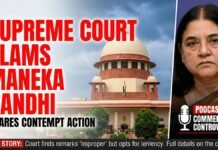
Key Points
- Supreme Court suspends sections 3(c), 3(d), and 3(e) of Waqf Amendment Act 2025 in interim order on September 15
- Five-year Islam adherence requirement for Waqf declaration temporarily stayed pending state government clarifications
- Court refuses to halt entire Act, emphasizes preferential appointment of Muslim CEOs for Waqf Boards
- Interim stay remains effective until states formulate rules to determine authentic Islamic faith adherence
- AIMPLB welcomes decision as relief from controversial provisions while government defends secular approach
- Act passed by Parliament in April 2025 with Presidential assent on April 8, immediately challenged in apex court
- District Collector powers and non-Muslim CEO appointments remain contentious issues for future hearings
New Delhi: The Supreme Court delivered a carefully calibrated interim judgment on Monday regarding the contentious Waqf (Amendment) Act 2025, striking down specific provisions while refusing to stay the entire legislation. Chief Justice BR Gavai-led bench pronounced the much-awaited decision after reserving the order on May 22, following extensive hearings that spanned three consecutive days.
The court’s nuanced approach addresses immediate concerns raised by petitioners while allowing the broader framework of Waqf reform to proceed. This interim relief comes nearly five months after the Act received Presidential assent on April 8, 2025, triggering immediate legal challenges from various Muslim organizations and civil rights groups.
Specific Provisions Under Interim Stay
Five-Year Islam Adherence Requirement
The most significant suspension involves the controversial five-year Islam adherence requirement under sections 3(c), 3(d), and 3(e). This provision mandated that individuals seeking to declare Waqf properties must demonstrate continuous adherence to Islamic faith for a minimum period of five years preceding their declaration.
The Supreme Court found this requirement problematic due to the absence of clear state-level mechanisms to verify authentic religious adherence. The interim stay will remain in effect until individual state governments formulate comprehensive rules and procedures for determining legitimate Islamic faith practice, addressing concerns about arbitrary implementation and potential misuse.
Legal experts suggest this decision provides breathing room for states to develop transparent, non-discriminatory verification processes that respect religious autonomy while preventing fraudulent Waqf declarations.
CEO Appointment Guidelines
While refusing to completely prohibit non-Muslim CEO appointments, the Supreme Court issued strong preferential guidelines for Waqf Board leadership positions. The court emphasized that “as far as possible,” Chief Executive Officer positions should be reserved for Muslim candidates, acknowledging the religious and cultural significance of these roles.
This directive represents a compromise position, maintaining constitutional equality principles while recognizing the specialized nature of Islamic religious property management. The court’s language suggests that non-Muslim appointments should only occur in exceptional circumstances where qualified Muslim candidates are unavailable.
Constitutional and Legal Arguments
Petitioners’ Comprehensive Challenge
The legal challenge, spearheaded by prominent constitutional lawyers including senior advocate Kapil Sibal, presented multifaceted objections to the amended legislation. Petitioners argued that the Act’s broad provisions for property removal from Waqf status create dangerous precedents for arbitrary government interference in religious endowments.
A particularly contentious issue involved granting District Collectors authority to reclassify Waqf properties as government land. Petitioners contended this provision violates constitutional protections for religious property and undermines centuries-old Islamic trust traditions through administrative rather than judicial processes.
The membership restrictions for Waqf Boards and Councils also drew criticism, with petitioners arguing that non-Muslim participation in governing Islamic religious endowments contradicts fundamental principles of religious autonomy and community self-governance.
Government’s Secular Interpretation
Solicitor General Tushar Mehta, representing the Central Government, advanced a secular interpretation of Waqf institutions, arguing that religious endowments should be subject to general administrative oversight regardless of their spiritual origins. The government’s position emphasizes regulatory uniformity and transparency over religious exclusivity.
The government distinguished between Waqf as a social practice and essential religious rights, suggesting that administrative reforms do not infringe upon core Islamic beliefs. This interpretation supports broader inclusion of non-Muslim professionals in Waqf management while maintaining respect for Islamic traditions.
Detailed Analysis of Suspended Sections
Section 3(c): Property Declaration Requirements
This provision established stringent documentation requirements for Waqf property declarations, including the five-year Islam adherence criterion. The suspension acknowledges practical difficulties in implementing uniform verification standards across diverse state jurisdictions with varying administrative capabilities.
The interim stay allows time for developing standardized procedures that balance religious authenticity concerns with constitutional due process protections, preventing potential discrimination against recent converts or individuals with complex religious histories.
Section 3(d): Verification Mechanisms
Originally designed to prevent fraudulent Waqf claims, this section created elaborate verification processes that critics argued could be weaponized against legitimate Islamic institutions. The suspension provides opportunity for refining these mechanisms to ensure they serve their protective purpose without enabling harassment of genuine Waqf administrators.
Section 3(e): Appeal and Review Procedures
The suspended provision established appeal procedures for contested Waqf declarations, including timelines and documentation requirements. Legal experts welcomed the stay, citing concerns about inadequate procedural safeguards and potential for administrative delays affecting urgent religious property matters.
Stakeholder Reactions and Implications
AIMPLB’s Cautious Optimism
All India Muslim Personal Law Board spokesperson Syed Qasim Rasool Ilyas expressed measured satisfaction with the Supreme Court’s decision, characterizing it as providing necessary breathing room for community concerns. The organization views the partial stay as vindication of their constitutional challenge while acknowledging the need for continued legal engagement.
The AIMPLB’s response suggests acceptance of the court’s balanced approach, recognizing that complete nullification was unlikely given the legislation’s Parliamentary approval and Presidential assent. The organization has indicated willingness to participate constructively in developing implementation guidelines during the interim period.
Political and Administrative Impact
The interim order creates immediate compliance challenges for state governments, which must now develop verification mechanisms for Islamic faith adherence while respecting religious freedom principles. This requirement may lead to interstate variations in implementation, potentially creating forum shopping opportunities for Waqf declarations.
Administrative officials express concern about the practical difficulties of religious verification without infringing upon personal faith privacy. The court’s directive requires balancing transparency demands with respect for individual religious autonomy and community traditions.
Legal Precedent and Future Implications
Constitutional Balance
The Supreme Court’s approach reflects broader constitutional tensions between religious community rights and secular administrative authority. By refusing complete nullification while suspending problematic provisions, the court maintains space for legislative reform while protecting immediate community interests.
This decision may influence future cases involving religious property rights, establishing precedents for judicial review of legislation affecting minority religious institutions. The emphasis on preferential religious leadership while maintaining constitutional equality suggests evolving jurisprudence on religious autonomy.
Reform Timeline and Next Steps
The interim nature of the current order means substantive hearings will continue once states develop required implementation frameworks. Legal observers anticipate that the final judgment will provide comprehensive guidance on balancing religious community rights with administrative transparency requirements.
The court’s timeline effectively creates a trial period for testing the legislation’s practical implementation while protecting against immediate harm to existing Waqf institutions. This approach allows for evidence-based evaluation of the Act’s real-world impact before final constitutional determination.
Long-term Implications for Religious Property Rights
The case represents a significant test of India’s commitment to protecting minority religious institutions while ensuring administrative accountability. The outcome will influence not only Islamic Waqf properties but potentially other religious endowments facing similar regulatory challenges.
The Supreme Court’s careful balancing act suggests recognition that hasty implementation of religious property reforms could undermine constitutional secularism while acknowledging legitimate governance concerns about transparency and accountability in religious institutions.















































